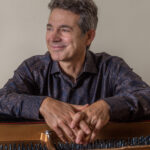Beethoven
Week of July 17, 2021
Concerts
The first program features Beethoven’s very first sonata, a winning work in four-movements, preceded by 3 preludes and fugues by Bach which inspired Beethoven. The second program features Beethoven’s magnificent late sonata opus 106 (the “Hammerklavier”), one of his most innovative, challenging, and deeply moving works.
Program I
Prelude and Fugue in C Major, book II
Prelude in D# minor and Fugue in E-flat minor, book I
Prelude and Fugue in G major, book I J.S. Bach
Sonata, Opus 2, no 1 in F minor Beethoven
Allegro
Adagio
Menuetto & Trio: Allegretto
Prestissimo
Program II
Sonata in B-flat major, Opus 106 (“Hammerklavier”)
Allegro
Scherzo: Assai vivace
Adagio sostenuto: Appassionato e con molto sentimento
Largo; Allegro risoluto: Fuga a tre voci, con alcune licenze
Presentation for Music Lovers:
Beethoven’s “Hammerklavier” Sonata: obsession and innovation
In 1918 Ludwig van Beethoven completed his Sonata in B-flat major, Opus 106, giving it the title “Grosse Sonate für das Hammer-Klavier”. It is the second of the five great late piano sonatas Beethoven wrote between 1816 and 1822 and arguably the most monumental of all Beethoven’s sonatas. This work is full of challenges: for the performer, because of its unprecedented length, difficulty, and emotional range; and for the composer, who utilizes the newly expanded range as a structural element, and sets himself the daunting goal of composing the most expansive and challenging sonata ever written, based entirely on a single interval. With many examples, I will demonstrate how Beethoven achieved this feat, and how he obsessively focused on the 3rdas a melodic, harmonic, and structural element. I will pay special attention to the sublime slow movement and to the finale, a fugue which is Beethoven’s final word on Bach-inspired counterpoint, rivaled only by the “Grosse Fuge” for string quartet.
 Aleck Karis has performed recitals, chamber music, and concertos across the Americas, Europe, Japan, and China. As the pianist of the new music ensemble Speculum Musicae he has participated in over a hundred premieres and performed at major American and European festivals. His appearances with orchestra have ranged from concertos by Mozart, Beethoven and Chopin to those of Stravinsky, Messiaen and Carter. His seven solo discs on Bridge Records are: Chopin/Carter/Schumann, Mozart, Stravinsky, Cage, Feldman/Webern/Wolpe, Poulenc, and most recently, Debussy. His two discs on Roméo Records are Music of Philip Glass and Late Chopin. A Distinguished Professor of music at the UCSD, he has studied at the Manhattan School and Juilliard, and his teachers include William Daghlian, Artur Balsam and Beveridge Webster.
Aleck Karis has performed recitals, chamber music, and concertos across the Americas, Europe, Japan, and China. As the pianist of the new music ensemble Speculum Musicae he has participated in over a hundred premieres and performed at major American and European festivals. His appearances with orchestra have ranged from concertos by Mozart, Beethoven and Chopin to those of Stravinsky, Messiaen and Carter. His seven solo discs on Bridge Records are: Chopin/Carter/Schumann, Mozart, Stravinsky, Cage, Feldman/Webern/Wolpe, Poulenc, and most recently, Debussy. His two discs on Roméo Records are Music of Philip Glass and Late Chopin. A Distinguished Professor of music at the UCSD, he has studied at the Manhattan School and Juilliard, and his teachers include William Daghlian, Artur Balsam and Beveridge Webster.